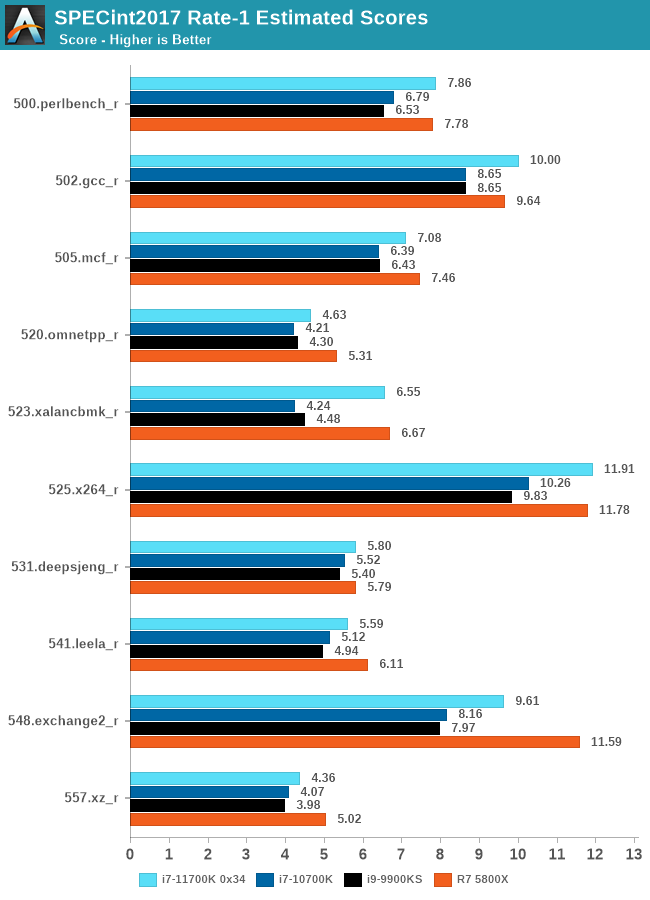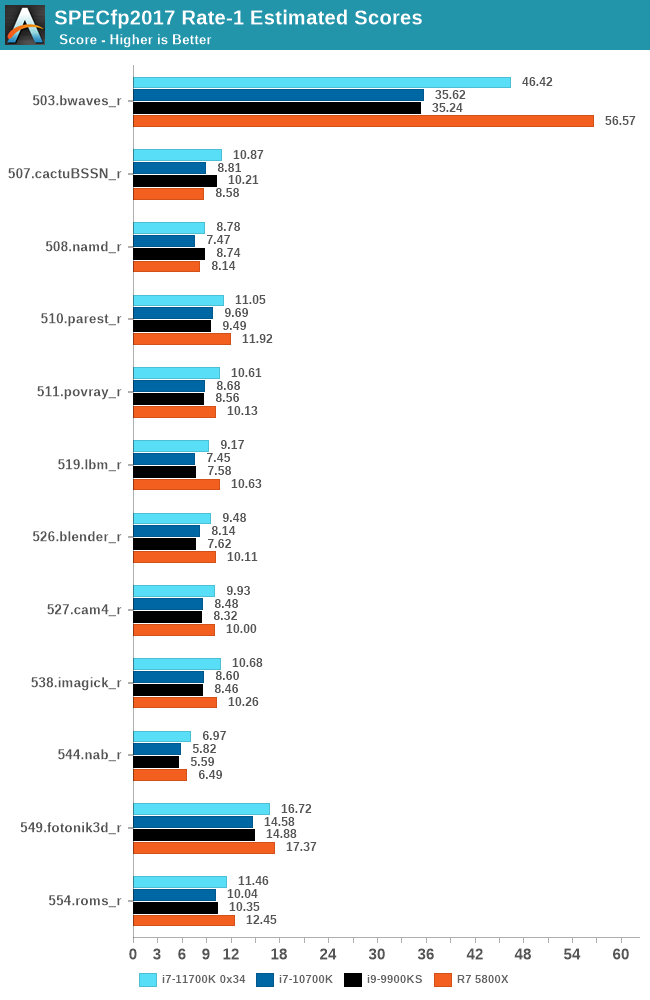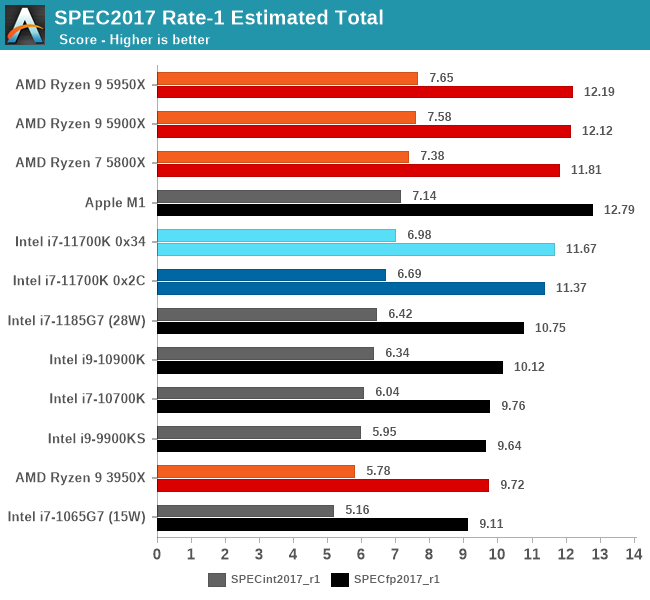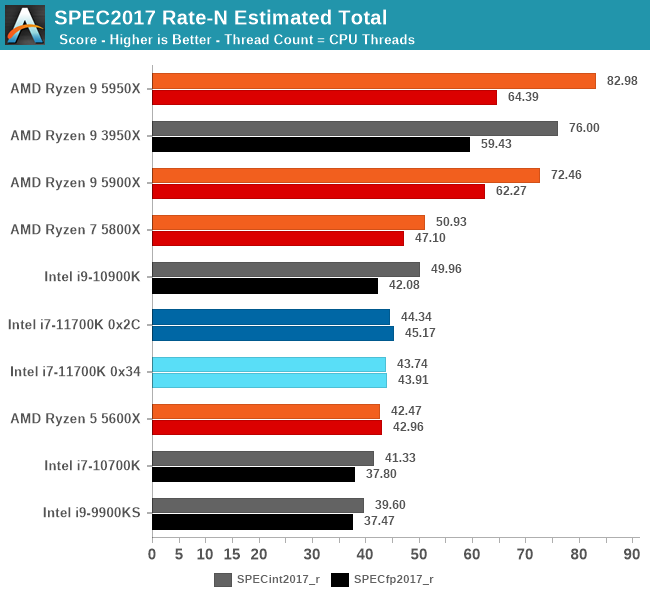Intel Core i7-11700K Review: Blasting Off with Rocket Lake
by Dr. Ian Cutress on March 5, 2021 4:30 PM EST- Posted in
- CPUs
- Intel
- 14nm
- Xe-LP
- Rocket Lake
- Cypress Cove
- i7-11700K
CPU Tests: SPEC
Page by Andrei Frumusanu
SPEC2017 is a series of standardized tests used to probe the overall performance between different systems, different architectures, different microarchitectures, and setups. The code has to be compiled, and then the results can be submitted to an online database for comparison. It covers a range of integer and floating point workloads, and can be very optimized for each CPU, so it is important to check how the benchmarks are being compiled and run.
We run the tests in a harness built through Windows Subsystem for Linux, developed by our own Andrei Frumusanu. WSL has some odd quirks, with one test not running due to a WSL fixed stack size, but for like-for-like testing is good enough. Because our scores aren’t official submissions, as per SPEC guidelines we have to declare them as internal estimates from our part.
For compilers, we use LLVM both for C/C++ and Fortan tests, and for Fortran we’re using the Flang compiler. The rationale of using LLVM over GCC is better cross-platform comparisons to platforms that have only have LLVM support and future articles where we’ll investigate this aspect more. We’re not considering closed-sourced compilers such as MSVC or ICC.
clang version 10.0.0
clang version 7.0.1 (ssh://git@github.com/flang-compiler/flang-driver.git
24bd54da5c41af04838bbe7b68f830840d47fc03)
-Ofast -fomit-frame-pointer
-march=x86-64
-mtune=core-avx2
-mfma -mavx -mavx2
Our compiler flags are straightforward, with basic –Ofast and relevant ISA switches to allow for AVX2 instructions. We decided to build our SPEC binaries on AVX2, which puts a limit on Haswell as how old we can go before the testing will fall over. This also means we don’t have AVX512 binaries, primarily because in order to get the best performance, the AVX-512 intrinsic should be packed by a proper expert, as with our AVX-512 benchmark. All of the major vendors, AMD, Intel, and Arm, all support the way in which we are testing SPEC.
To note, the requirements for the SPEC licence state that any benchmark results from SPEC have to be labeled ‘estimated’ until they are verified on the SPEC website as a meaningful representation of the expected performance. This is most often done by the big companies and OEMs to showcase performance to customers, however is quite over the top for what we do as reviewers.
For the new Cypress Cove based i7-11700K, we haven’t had quite the time to investigate the new AVX-512 instruction differences – since this is the first consumer desktop socketed CPU with the new ISA extensions it’s something we’ll revisit in the full review. Based on our testing on the server core counterparts however, it doesn’t make any noticeable differences in SPEC.

In the SPECint2017 suite, we’re seeing the new i7-11700K able to surpass its desktop predecessors across the board in terms of performance. The biggest performance leap is found in 523.xalancbmk which consists of XML processing at a large +54.4% leap versus the 10700K.
The rest of the improvements range in the +0% to +15% range, with an average total geomean advantage of +15.5% versus the 10700K. The IPC advantage should be in the +18.5% range.

In the FP scores, there’s nothing standing out too much, with general even improvements across the board. The total improvement here is +19.6%, with the IPC improvement in the +22% range.

Although the new Cypress Cove cores in the 11700K do have good generational IPC improvements, that’s all compared to the quite old predecessor, meaning that for single-thread performance, the advancements aren’t enough to quite keep up with the latest Zen3 competition from AMD, or for that matter, the Firestorm cores in Apple’s new M1.

More interesting are the multi-threaded SPEC results. Here, the new generation from Intel is showcasing a +5.8% and +16.2% performance improvement over its direct predecessor. Given the power draw increases we’ve seen this generation, those are rather unimpressive results, and actually represent a perf/W regression. AMD’s current 6-core 5600X actually is very near to the new 11700K, but consuming a fraction of the power.










541 Comments
View All Comments
Oxford Guy - Wednesday, March 10, 2021 - link
Worse.Bulldozer came from a money-starved little company, a company that couldn’t capitalize on having the superior design because of Intel’s monopolization.
This chip is from the big rich company that stomped on AMD with dirty tricks.
So, no. As stupid as Bulldozer was, this CPU seems to be quite a bit more unjustified.
ThereSheGoes - Wednesday, March 10, 2021 - link
Well, the results in this article are clearly not just wrong, but very wrong. https://www.hardwareluxx.de/index.php/artikel/hard...Bagheera - Wednesday, March 10, 2021 - link
did you even read the article you linked? it's taking 5800X in most benchmarks just like the Anandtech review.if you mean the gaming benches in the other review - 3 games is a terrible sample size and it still loses to 5800x in 2 out of 3.
Beaver M. - Wednesday, March 10, 2021 - link
Look at the results with the new BIOS.This review here is obsolete.
Hifihedgehog - Friday, March 12, 2021 - link
LOL. Fanboy delusion.First off, let's take a quick looksie at the Cinebench R20 results:
https://www.hardwareluxx.de/index.php/artikel/hard...
When switching from BIOS version 0402 to 0603, the 11700K's single-threaded performance actually DROPS from a score of 609 to 600. And its multicore performance is still less than the 10900K and the 5800X.
Switching gears, the games are no less unflattering:
https://www.hardwareluxx.de/index.php/artikel/hard...
The 11700K there, regardless of which of the two BIOS releases it uses, often loses to the 10900K and Ryzen 5000 series. It loses to the Ryzen 5000 series and 10900K in THREE out of the four games: The Division 2, Metro Exodus, The Shadow of the Tomb Raider.
In short: dude, what are you smoking?
Beaver M. - Wednesday, March 10, 2021 - link
As expected new reviews with newer BIOS versions improve performance significantly and puts the numbers to expected levels as well.This was a quick shot of a review and I fear it has tainted Cutress reputation a lot, especially because he defended it that much, even on video.
Oxford Guy - Wednesday, March 10, 2021 - link
With what power consumption?Raising performance by pushing power even higher may improve things like FPS in gaming tests but it obscures the big picture.
Want to talk about reputation? Remember the giant fridge-sized chiller Intel surreptitiously used to give a benchmark demo? Or, remember the ‘GenuineIntel’ fiasco? Or, remember the cute trick of putting a black box CPU inside the one people pay for, so that only special customers get the option of avoiding that particular spyware?
Somehow I think the writers here are going to be very hard pressed to challenge Intel in the cheatiness department, even without mentioning Intel’s history of abusing its monopoly power via OEM deals and the like.
Qasar - Wednesday, March 10, 2021 - link
Oxford Guy you forgot about how intel kept saying that 10 nm is " on track " the last 3-4 years :-)Qasar - Wednesday, March 10, 2021 - link
Beaver M" new reviews with newer BIOS versions improve performance significantly " from what i can tell from the graphs, for the most part, while performance may have improved over previous gen, it looks like it still looses to zen 3, but definitely not significantly, and still using more power then zen 3 overall, not that much of an improvement. a little upset that intel didnt get any performance crowns back, maybe, and that rocket lake still looks to be a dud ?
Bagheera - Thursday, March 11, 2021 - link
I fail to see the performance improvements in this other review. the games chosen were different (only 3 games? really?), and still lost to 5800X in 2/3.is it just "better" relative to last gen performance? the other review only tested a single resolution (and again, 3 whole games!)